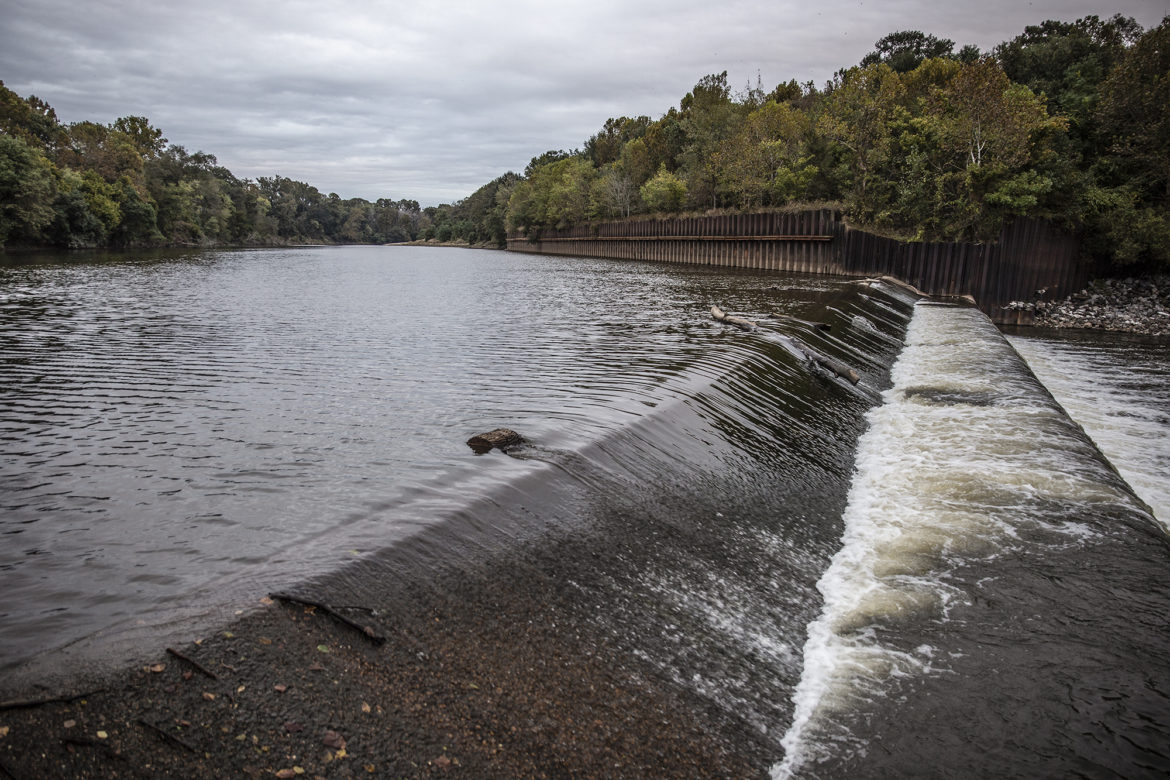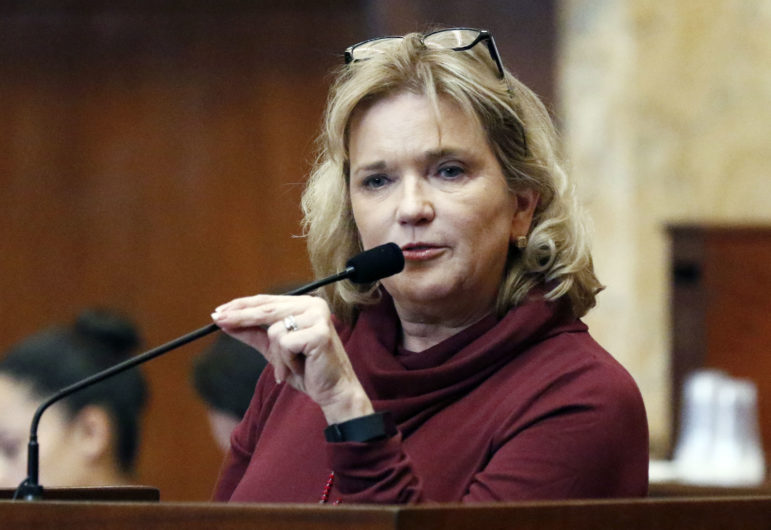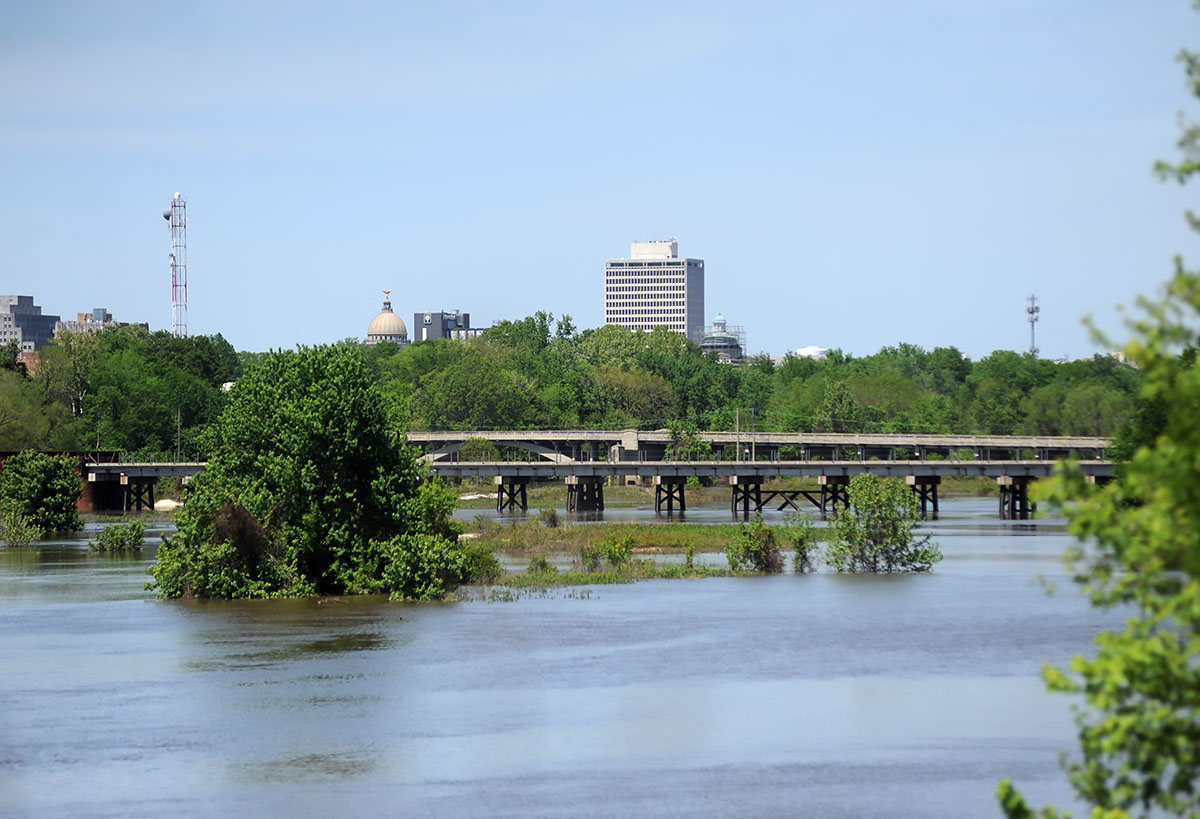Mississippi Today
Lawmaker seeks fines for Jackson over river pollution, despite ongoing federal enforcement

Lawmaker seeks fines for Jackson over river pollution, despite ongoing federal enforcement
Rep. Becky Currie, R-Brookhaven, is hoping to bring more accountability over Jackson’s ongoing pollution of the Pearl River through the city’s failing wastewater system, despite a federal agency already enforcing the issue through a consent decree.
House Bill 1094, which passed through its House committee last Tuesday, would fine the capital city up to $1 million for each “improper disposal” of wastewater or sewage into the river.
Currie said a consent decree being enforced by the Environmental Protection Agency and Mississippi Department of Environmental Quality since 2012 is not doing enough to protect the Pearl River from Jackson’s pollution. The fines that could result from HB 1094, she explained, would go to help clean up the river in the areas of the state downstream from Jackson.

“When you dump raw sewage in (the Pearl River) for other counties to worry about, it’s disgusting,” said Currie, who’s district includes towns, such as Monticello, bordering the river downstream of Jackson. “When you go down the Pearl River, you can see toilet paper hanging off little branches.”
Currie said that the Mississippi Department of Environmental Quality told her that the agency hasn’t yet fined Jackson for such discharges, but an MDEQ spokesperson clarified that it hasn’t issued a fine since the 2012 federal consent decree.
The agency has collected nearly half a million dollars in fines over the city’s wastewater issues, which includes a $240,000 penalty assessed in 2010 for violations at Jackson’s Savanna Street plant, and a $175,000 fine issued as a result of the 2012 order.
The consent agreement gave Jackson about 18 years to make a list of fixes with its wastewater system, but required most of those fixes to be done within 11 years, or by November this year. Citing a lack of funding and staffing, the city hasn’t completed many of the required fixes, and is now attempting to renegotiate the settlement with the EPA.

Currie didn’t speak to how this bill would impact the EPA’s dealing of the issue, saying only that whatever enforcement is happening is not enough.
“(The EPA) is obviously not on top of it if (the pollution) continues to happen,” she said. “How many years has this gone on? So everybody downstream should just pay the price for Jackson not tending to their business?”
Currie called the Pearl River important for the “way of life” of communities downstream of Jackson, with Mississippians using the river to swim, canoe and catch fish. She said that polluting the river is harmful in a number of ways, affecting oysters on the Coast as well as businesses that use the water such as Georgia Pacific, although the latter of which is itself a top polluter in Mississippi. Over the last five years, Georgia Pacific pulp mill on the Leaf River has been among the facilities with the most toxic releases in the state with 15.7 million pounds.
When asked about HB 1094, Jackson Mayor Chokwe Antar Lumumba said he questioned the legality of “a number of things being suggested,” and that there is an “order to these things” being led by the EPA. The mayor added that lawmakers this session are looking to punish Jackson in a number of ways.
“We are clearly the object of the state House’s affection,” Lumumba said Monday during a press conference. “I think that they’re just more ways contemplated to be increasingly punitive of the city of Jackson. Let’s call a spade a spade.”
In its latest annual report last spring, Jackson reported 13 prohibited bypasses, or times when the city allowed untreated or partially treated wastewater into the river, usually because of too much water entering the plant at one time. Those bypasses totaled 2.1 billion gallons between March 2021 and February 2022, a 30% decrease from the previous year.
The city also reported over 500 sanitary sewer overflows from its collection system in that time, or more than one every day. Those overflows are when untreated sewage leaks out of the system, and the city said most of its overflows that year happened because of either grease blockages or collapsed pipes.
Since 2019, MDEQ has cautioned residents against activities such as swimming, wading or fishing in the segment of the Pearl River neighboring Jackson. The agency later updated the advisory to include streams, such as Hanging Moss Creek and Eubanks Creek, that flow through the city.
The federal consent decree says the city is subject to fines for additional Clean Water Act violations, including a $10,000 penalty for each prohibited bypass and a $2,000 penalty for each sanitary sewer overflow.

“Historically, EPA has taken the lead on enforcements under all federal consent decrees, and in any event, MDEQ, because we are co-plaintiffs with EPA, cannot take unilateral action to collect the stipulated penalties,” MDEQ spokesperson Jan Schaefer told Mississippi Today. “In the meantime, MDEQ, along with EPA, has been ‘assessing’ stipulated penalties and those stipulated penalties continue to accrue.”
Neither agency could say how much Jackson has accrued in penalties since the 2012 order before this story published.
Jackson, Meridian, Hattiesburg and Greenville are all under a federal consent decree because of wastewater violations. While those cities are starting to see support through historic new federal infrastructure funds, leaders of those cities told Mississippi Today last year that more money is needed to make all the necessary repairs.
This article first appeared on Mississippi Today and is republished here under a Creative Commons license.
Did you miss our previous article…
https://www.biloxinewsevents.com/?p=207600
Mississippi Today
1964: Mississippi Freedom Democratic Party was formed
April 26, 1964

Civil rights activists started the Mississippi Freedom Democratic Party to challenge the state’s all-white regular delegation to the Democratic National Convention.
The regulars had already adopted this resolution: “We oppose, condemn and deplore the Civil Rights Act of 1964 … We believe in separation of the races in all phases of our society. It is our belief that the separation of the races is necessary for the peace and tranquility of all the people of Mississippi, and the continuing good relationship which has existed over the years.”
In reality, Black Mississippians had been victims of intimidation, harassment and violence for daring to try and vote as well as laws passed to disenfranchise them. As a result, by 1964, only 6% of Black Mississippians were permitted to vote. A year earlier, activists had run a mock election in which thousands of Black Mississippians showed they would vote if given an opportunity.
In August 1964, the Freedom Party decided to challenge the all-white delegation, saying they had been illegally elected in a segregated process and had no intention of supporting President Lyndon B. Johnson in the November election.
The prediction proved true, with white Mississippi Democrats overwhelmingly supporting Republican candidate Barry Goldwater, who opposed the Civil Rights Act. While the activists fell short of replacing the regulars, their courageous stand led to changes in both parties.
This article first appeared on Mississippi Today and is republished here under a Creative Commons Attribution-NoDerivatives 4.0 International License.![]()
Mississippi Today
Mississippi River flooding Vicksburg, expected to crest on Monday
Warren County Emergency Management Director John Elfer said Friday floodwaters from the Mississippi River, which have reached homes in and around Vicksburg, will likely persist until early May. Elfer estimated there areabout 15 to 20 roads underwater in the area.
“We’re about half a foot (on the river gauge) from a major flood,” he said. “But we don’t think it’s going to be like in 2011, so we can kind of manage this.”
The National Weather projects the river to crest at 49.5 feet on Monday, making it the highest peak at the Vicksburg gauge since 2020. Elfer said some residents in north Vicksburg — including at the Ford Subdivision as well as near Chickasaw Road and Hutson Street — are having to take boats to get home, adding that those who live on the unprotected side of the levee are generally prepared for flooding.



“There are a few (inundated homes), but we’ve mitigated a lot of them,” he said. “Some of the structures have been torn down or raised. There are a few people that still live on the wet side of the levee, but they kind of know what to expect. So we’re not too concerned with that.”
The river first reached flood stage in the city — 43 feet — on April 14. State officials closed Highway 465, which connects the Eagle Lake community just north of Vicksburg to Highway 61, last Friday.

Elfer said the areas impacted are mostly residential and he didn’t believe any businesses have been affected, emphasizing that downtown Vicksburg is still safe for visitors. He said Warren County has worked with the U.S. Army Corps of Engineers and the Mississippi Emergency Management Agency to secure pumps and barriers.
“Everybody thus far has been very cooperative,” he said. “We continue to tell people stay out of the flood areas, don’t drive around barricades and don’t drive around road close signs. Not only is it illegal, it’s dangerous.”
NWS projects the river to stay at flood stage in Vicksburg until May 6. The river reached its record crest of 57.1 feet in 2011.




This article first appeared on Mississippi Today and is republished here under a Creative Commons Attribution-NoDerivatives 4.0 International License.![]()
Mississippi Today
With domestic violence law, victims ‘will be a number with a purpose,’ mother says
Joslin Napier. Carlos Collins. Bailey Mae Reed.
They are among Mississippi domestic violence homicide victims whose family members carried their photos as the governor signed a bill that will establish a board to study such deaths and how to prevent them.
Tara Gandy, who lost her daughter Napier in Waynesboro in 2022, said it’s a moment she plans to tell her 5-year-old grandson about when he is old enough. Napier’s presence, in spirit, at the bill signing can be another way for her grandson to feel proud of his mother.
“(The board) will allow for my daughter and those who have already lost their lives to domestic violence … to no longer be just a number,” Gandy said. “They will be a number with a purpose.”
Family members at the April 15 private bill signing included Ashla Hudson, whose son Collins, died last year in Jackson. Grandparents Mary and Charles Reed and brother Colby Kernell attended the event in honor of Bailey Mae Reed, who died in Oxford in 2023.
Joining them were staff and board members from the Mississippi Coalition Against Domestic Violence, the statewide group that supports shelters and advocated for the passage of Senate Bill 2886 to form a Domestic Violence Facility Review Board.
The law will go into effect July 1, and the coalition hopes to partner with elected officials who will make recommendations for members to serve on the board. The coalition wants to see appointees who have frontline experience with domestic violence survivors, said Luis Montgomery, public policy specialist for the coalition.
A spokesperson from Gov. Tate Reeves’ office did not respond to a request for comment Friday.
Establishment of the board would make Mississippi the 45th state to review domestic violence fatalities.
Montgomery has worked on passing a review board bill since December 2023. After an unsuccessful effort in 2024, the coalition worked to build support and educate people about the need for such a board.
In the recent legislative session, there were House and Senate versions of the bill that unanimously passed their respective chambers. Authors of the bills are from both political parties.
The review board is tasked with reviewing a variety of documents to learn about the lead up and circumstances in which people died in domestic violence-related fatalities, near fatalities and suicides – records that can include police records, court documents, medical records and more.
From each review, trends will emerge and that information can be used for the board to make recommendations to lawmakers about how to prevent domestic violence deaths.
“This is coming at a really great time because we can really get proactive,” Montgomery said.
Without a board and data collection, advocates say it is difficult to know how many people have died or been injured in domestic-violence related incidents.
A Mississippi Today analysis found at least 300 people, including victims, abusers and collateral victims, died from domestic violence between 2020 and 2024. That analysis came from reviewing local news stories, the Gun Violence Archive, the National Gun Violence Memorial, law enforcement reports and court documents.
Some recent cases the board could review are the deaths of Collins, Napier and Reed.
In court records, prosecutors wrote that Napier, 24, faced increased violence after ending a relationship with Chance Fabian Jones. She took action, including purchasing a firearm and filing for a protective order against Jones.
Jones’s trial is set for May 12 in Wayne County. His indictment for capital murder came on the first anniversary of her death, according to court records.
Collins, 25, worked as a nurse and was from Yazoo City. His ex-boyfriend Marcus Johnson has been indicted for capital murder and shooting into Collins’ apartment. Family members say Collins had filed several restraining orders against Johnson.
Johnson was denied bond and remains in jail. His trial is scheduled for July 28 in Hinds County.
He was a Jackson police officer for eight months in 2013. Johnson was separated from the department pending disciplinary action leading up to immediate termination, but he resigned before he was fired, Jackson police confirmed to local media.
Reed, 21, was born and raised in Michigan and moved to Water Valley to live with her grandparents and help care for her cousin, according to her obituary.
Kylan Jacques Phillips was charged with first degree murder for beating Reed, according to court records. In February, the court ordered him to undergo a mental evaluation to determine if he is competent to stand trial, according to court documents.
At the bill signing, Gandy said it was bittersweet and an honor to meet the families of other domestic violence homicide victims.
“We were there knowing we are not alone, we can travel this road together and hopefully find ways to prevent and bring more awareness about domestic violence,” she said.
This article first appeared on Mississippi Today and is republished here under a Creative Commons Attribution-NoDerivatives 4.0 International License.
-

 News from the South - Florida News Feed6 days ago
News from the South - Florida News Feed6 days agoJim talks with Rep. Robert Andrade about his investigation into the Hope Florida Foundation
-

 News from the South - Alabama News Feed5 days ago
News from the South - Alabama News Feed5 days agoPrayer Vigil Held for Ronald Dumas Jr., Family Continues to Pray for His Return | April 21, 2025 | N
-

 Mississippi Today5 days ago
Mississippi Today5 days ago‘Trainwreck on the horizon’: The costly pains of Mississippi’s small water and sewer systems
-

 News from the South - Texas News Feed5 days ago
News from the South - Texas News Feed5 days agoMeteorologist Chita Craft is tracking a Severe Thunderstorm Warning that's in effect now
-

 News from the South - Florida News Feed4 days ago
News from the South - Florida News Feed4 days agoTrump touts manufacturing while undercutting state efforts to help factories
-

 News from the South - Texas News Feed7 days ago
News from the South - Texas News Feed7 days agoNo. 3 Texas walks off No. 9 LSU again to capture crucial SEC softball series
-

 News from the South - Florida News Feed4 days ago
News from the South - Florida News Feed4 days agoFederal report due on Lumbee Tribe of North Carolina’s path to recognition as a tribal nation
-

 News from the South - Arkansas News Feed6 days ago
News from the South - Arkansas News Feed6 days agoAs country grows more polarized, America needs unity, the ‘Oklahoma Standard,’ Bill Clinton says














































